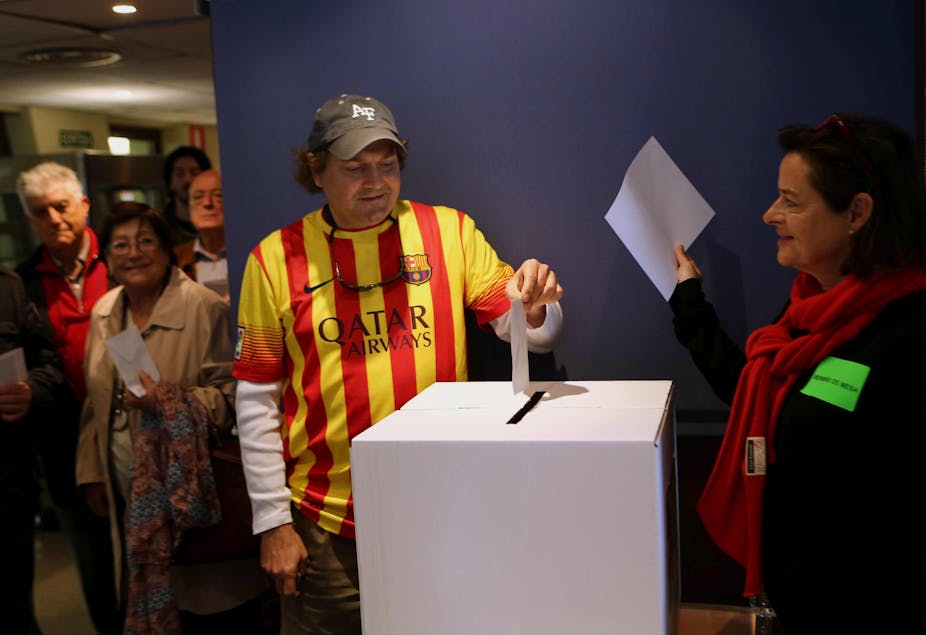Catalans have voted for independence in a referendum that holds no official sway but has enormous significance. Now Catalonia needs to decide where to turn next.
The referendum, held on November 9, was promoted by a coalition of forces, backed by the Catalan government, that argue that Catalonia has the “right to decide” whether it should be independent.
About 2.2 million people voted in what has been called a symbolic referendum. A significant 80.7% backed total independence. Between 10% and 11% wished Catalonia to federate with Spain and 5% supported the status quo. This was understandably seen as a success by the Catalan government and has strengthened the standing of its president, Artur Mas.
The turnout was comparable to the number of people who participated in the recent European elections in the region. That said, it was only about 36% of the total census and a long way off the 69% of the census who turned out to vote in 2012 for the Catalan government election.
Encouraged by the parties opposed to the referendum, the vast majority of those who favour either the constitutional status quo or more moderate reform simply did not vote. It was, after all, a referendum that was to have no tangible outcome and was opposed by the Spanish state. So while the turnout was impressive, the result also indicates that separatists would not necessarily get an easy ride from the “no” camp if a real referendum were to take place.
Long time coming
This vote was the fifth major mobilisation of Catalan society since 2010. The catalyst for this wave of action was a decision by Spain’s Constitutional Tribunal to annul key parts of the new Catalan Autonomy statute. The statute had been agreed with the Socialist government and approved by the Spanish parliament but was referred to the tribunal by the opposition Popular Party.
The ruling brought to the fore a number of concerns within Catalan society about Spain’s constitutional arrangements and their economic implications. There has been a growing discontent with how much money Catalonia gets from the central state and the relatively low level of investment in its infrastructure. The severe recession that has hit Spain has only aggravated this discontent.
What’s more, there is a belief that Catalans are not particularly well liked in parts of Spain. This has certainly been exacerbated by the use, in the past, of anti-Catalan rhetoric by the People’s Party, which has been in power since 2011.
Catalans divided
Catalonia finds itself at something of an impasse. A deal will be difficult to achieve.
Some commentators believe that Mas will be willing to reach an accord short of outright independence. His coalition government has until now only been pushing for home rule; this call for full independence is relatively recent. What’s more, his main partner in the coalition, Josep Antoni Duran i Lleida, still favours federalism over separation from Spain.
But Mas voted for independence on November 9, and now wants all the parties in favour of Catalonia’s “right to decide” to form a single block in new elections to the Catalan parliament. Having demonstrated the dominance of these parties in Catalonia, he aims to negotiate with Spain’s central government about holding a “definitive referendum” on Catalan independence. His main rival within the “right to decide” camp, the leader of the Catalan Republican Left Oriol Junqueras, wants to go further and declare unilateral independence in the wake of victory in these elections to the Catalan parliament.
Perhaps Mas would change his stance were major concessions forthcoming from the centre. However, it is difficult to imagine the governing Popular Party making such concessions. For its part, the Socialist opposition will certainly be more flexible than the government, and now seems to be elaborating serious proposals for constitutional reform.
All this is playing out against an extraordinarily volatile political backdrop. The Popular Party and the Socialist Party have both been badly shaken by the economic recession and a string of corruption scandals. The latest opinion polls give them well under 30% of the popular vote each.
The new left-wing party Podemos is, on the other hand, in the ascendancy. Polling over 20% of the vote, despite being less than a year old, these newcomers could have influence in future negotiations and are likely to be more favourable to a full-blown federal alliance between Catalonia and Spain.
There will be both local and regional elections followed by a general election next year. These could trigger a massive reconfiguration of the Spanish political system and a new constitution that takes on board many Catalan demands.
Another scenario would see Catalan separatists taking advantage of a hung parliament to force through a referendum on independence. Or the Popular Party could retain its position as Spain’s major party and block major change. After a unique kind of referendum, anything could happen.

